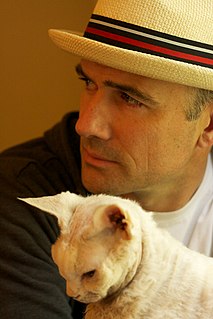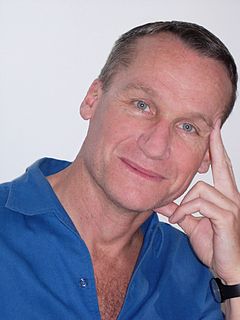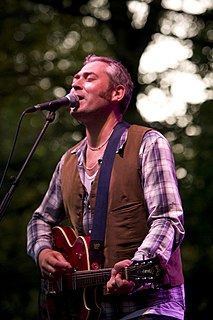A Quote by Jacqueline Woodson
We do inherently know that poetry is about the way we speak. It's about where we pause, where we drop our words in the middle of a sentence. It's about the rhythm and the cadence of the way we speak. It's about putting that down at the end of the day.
Related Quotes
We're painting the same people all our life - it's just the way we look at them that changes. If you experience trauma, you can speak about it in so many different ways. You can speak about landscape, you can speak about your food; it's always different. Trauma is the beginning of life as an artist.
When we speak about wisdom, we are speaking about Christ. When we speak about virtue, we are speaking about Christ. When we speak about justice, we are speaking about Christ. When we speak about peace, we are speaking about Christ. When we speak about truth and life and redemption, we are speaking about Christ.
You'll also hear about the widening gap in the educated and the uneducated. The liberals will all say, "We must do something about it" and some in our population swoon, "Oh, yes, it's so unfair, and so unfortunate, and we've gotta do something about the inequality." So the Democrats then have their reason to do something about it, and the way they go about it is not trying to make people equal at all. The way they go about it is not even rooted in changing inequality, at the end of the day. The way they go about it is destructive for everybody.
We can speak of politics, ethics, and in this way, speak about the world. But at the same time, it's always in a way that is totally nebulous and abstracted, this way of thinking about reality. And that's why I write the way I do - it's an almost immortal way to show dependence on the biological, the political, the moral parts of us. I say immortal because we now have to find new formats, new eloquences, and resolve within ourselves this "constructed" life, a life that is incomplete, imperfect.
I think all writing is about writing. All writing is a way of going out and exploring the world, of examining the way we live, and therefore any words you put down on the page about life will, at some level, also be words about words. It's still amazing, though, how many poems can be read as being analogous to the act of writing a poem. "Go to hell, go into detail, go for the throat" is certainly about writing, but it's also hopefully about a way of living.
People speak because they are afraid of silence. They speak mechanically whether aloud or to themselves. They are intoxicated by this vocal gruel that ensnares every object and every being. They talk about rain and fine weather; they talk about money, about love, about nothing. And even when they are talking about their most exalted love, they use words uttered a hundred times, threadbare phrases.
We need a better way to talk about eating animals. We need a way that brings meat to the center of public discussion in the same way it is often at the center of our plates. This doesn't require that we pretend we are going to have a collective agreement. However strong our intuitions are about what's right for us personally and even about what's right for others, we all know in advance that our positions will clash with those of our neighbors. What do we do with that most inevitable reality? Drop the conversation, or find a way to reframe it?
When I see a movie, the music often gets in the way for me. It's something that, say, for myself and Claire, we never, ever speak about. We never speak about describing emotion. I think it's about color and movement. And I think it's important to let the images be the melody, as well, a lot of the time - to create a kind of a backing for that, to let it sing.
I write and speak about personal and spiritual growth. One week I write about illness and another week I speak about relationships and another week I write about work and money and another week I speak to people with obesity issues. I write about whatever wounds seem to cry out for more enlightened solutions, and the love that heals them all.






































